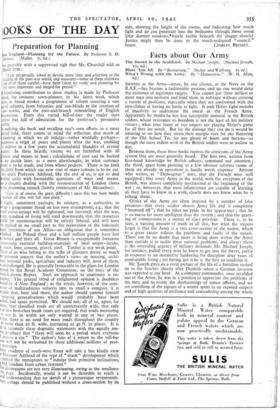OOKS OF THE DAY
Preparation for Planning
.ew England—Planning for the Future. By Professor S. D. Adshead. (Muller. 7S. 6d.)
s probably with a suppressed sigh that Mr. Churchill told us March 27th:
"I am perpetually asked to devote more time and attention to the building of the post-war world, and measures—some of them elaborate and all of them careful—have been taken by study and planning for that most important and longed-for period."
stimulating contribution to these studies is made by Professor cad, the eminent town-planner, in his latest work, which des in broad strokes a programme of reform covering a vast of subjects, from balconies and sun-blinds to the creation of new towns, and the root-and-branch remodelling of English 'stration. From this varied bill-of-fare the reader rises thless but full of admiration for the professor's persuasive tility.
studying the book and recalling one's own efforts in a more 'cted field, there comes to mind the reflection that much of planning in which we all indulge—rather wishfully perhaps- pposes a reign of peace and plenty after the war, enabling to redress in a few years the accumulated blunders of several tunes. In these beatific visions we are furnished with all fiances and means to boot ; calculations of cost can be burked we decide later, as a mere afterthought, in what currency era is to be made, and from whose pockets. There is no limit the cloth from which our new coat of many colours is to be cut. this spirit Professor Adshead, like the rest of us, is apt to deal ewhat airily with formidable questions of ways and means.
s a chapter dealing with the reconstruction of London closes the disarming remark (faintly reminiscent of Mr. Micawber): "Cost is of course the great difficulty ; once this has been boldly tackled, all else will fall into place."
t might, sometimes perhaps, be salutary, as a corrective, to up a programme based on less rosy assumptions, e.g., that the al purse-strings will be tightened, not loosened, after the war, our standard of living will tend downwards, that the resources able for reconstruction will be strictly limited, and will have be applied in no small part to the restoration of the hideously ted territories of our Allies—an obligation that is sometimes looked. In Poland three and a half million people have lost homes and their all. Great Britain is exceptionally fortunate Possessing essential building-materials of local origin—bricks, slates, lime, cement, gravel, steel. Timber is our weak point. ose of us who belong to the tribe of planners derive so much common sources that the author's views on housing, archi- e. national parks, agriculture and industry will, most of them, unchallenged. He is generally favourable to the plans for London red by the Royal Academy Committee, on the basis of the sey-Lutyens Report. Such an appioach to unanimity is en- ging. The general trend of enlightened opinion is doubtless .ed in A New England ; as the result, however, of the corn- tssion of multitudinous subjects into so small a compass, it is tsitable that, here and there, the author should commit himself sweeping generalisations which would probably have been ddified, had space permitted. We should not, all of us, agree, for dance, that classified roads are all unnecessarily wide, that only t or two first-class trunk roads are required, that roads measuring 'In 12o ft. in width are only wanted in one or two places, d that there is no need for main roads throughout the country be more than 20 ft. wide, increasing to 40 ft. in places. It is ed to reconcile these dogmatic statements with the equally =- lane prophecy that "there will soon be a period when everyone Possess a car." The author's hint of a return to the toll-bar dem will not be welcomed by these additional millions of post- e motorists. Some residents of south-west Essex will take a less kindly view Professor Adshead of the type of " shack " development which enabled the immigrants to "indulge their primitive inclinations, d find freedom from urban restraint." tile illustrations are not very illuminating, owing to the smallness the page. Incidentally, would it not be desirable to reach a Wal understanding that no sketch of a picturesque seventeenth- key cottage should be published without a cross-section by its
side, showing the height of the rooms, and indicating how much light and air can penetrate into the bedrooms through those sweet little dormer windows • barely visible beneath the shaggy thatch? Justice might then be done to the much-maligned " council "


























 Previous page
Previous page